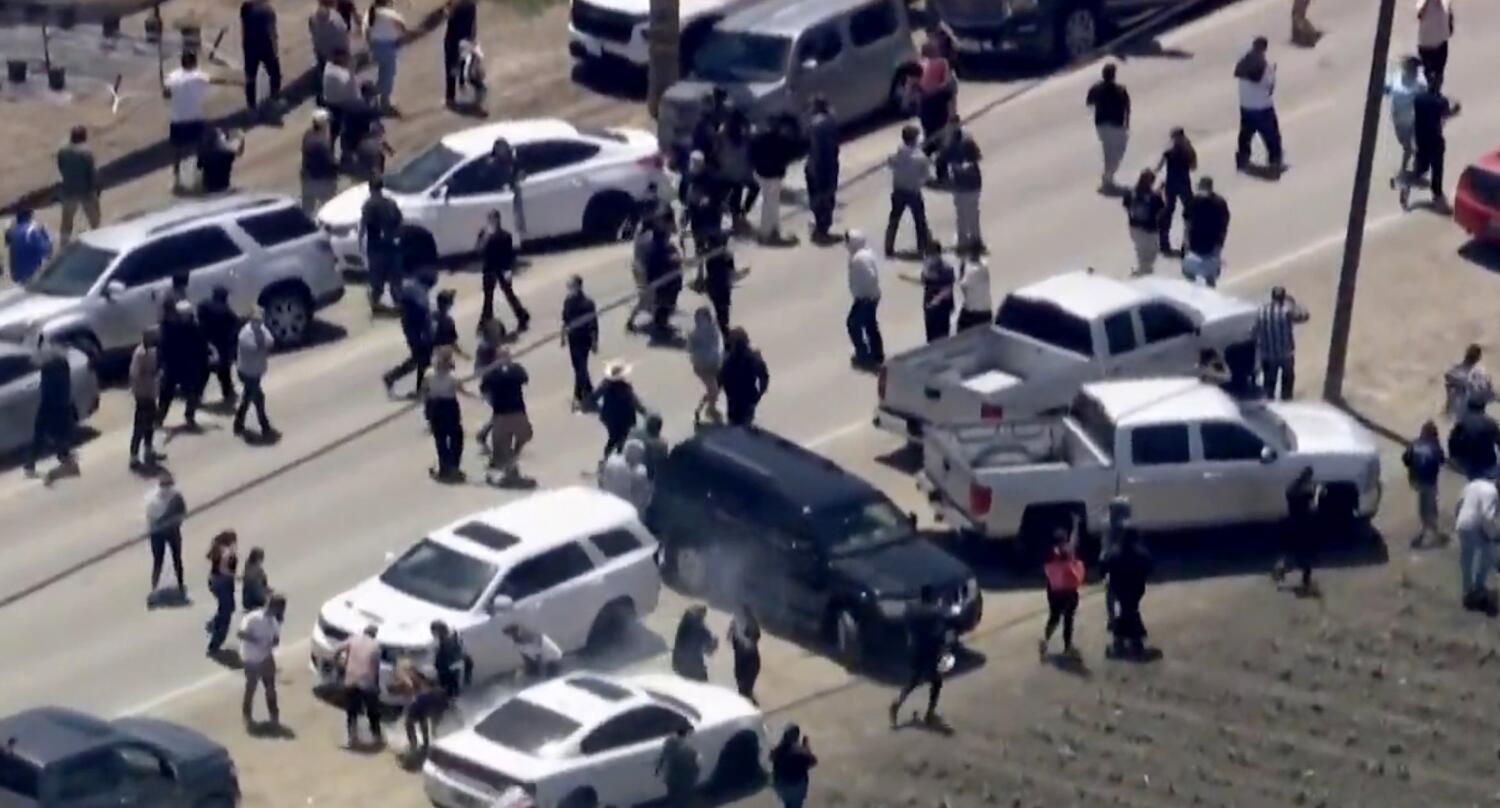There have been quite a few authorized challenges to President Trump’s immigration sweeps throughout California which have led to no less than 3,000 arrests.
However one lawsuit has the potential to dramatically alter the coverage.
The ruling
A coalition of civil rights teams and personal attorneys sued the federal authorities, difficult the circumstances of three immigrants and two U.S. residents swept up in chaotic arrests which have sparked widespread protests since early June.
On Friday, U.S. District Choose Maame Ewusi-Mensah Frimpong, an appointee of President Biden, briefly blocked federal brokers within the Southland from utilizing racial profiling to hold out immigration arrests after she discovered ample proof that brokers had been utilizing race, an individual’s job or their location, and their language to kind “reasonable suspicion” — the authorized normal wanted to detain a person.
Frimpong dominated that utilizing race, ethnicity, language, accent, location or employment as a pretext for immigration enforcement is forbidden by the 4th Modification, which protects in opposition to unreasonable searches and seizures by the federal government.
The order covers Los Angeles, Riverside, San Bernardino, Orange, Ventura, Santa Barbara and San Luis Obispo counties.
The decide additionally ordered that each one these in custody at a downtown detention facility generally known as B-18 should be given 24-hour entry to attorneys and a confidential telephone line.
On Monday, the administration requested a federal appeals courtroom to remain the decide’s order blocking the roving patrols, permitting it to renew raids throughout the seven California counties.
“It is untenable for a district judge to single-handedly ‘restructure the operations’ of federal immigration enforcement,” the enchantment argued. “This judicial takeover cannot be allowed to stand.”
What specialists are saying
Authorized specialists say it’s exhausting to say simply how profitable the federal authorities will probably be in getting a keep on the non permanent order, given the present political local weather.
“This is different from a lot of the other kinds of Trump litigation because the law is so clear in the fact finding by the district court,” stated Erwin Chemerinsky, dean of the UC Berkeley College of Legislation. “So if you follow basic legal principles, this is a very weak case for the government on appeal, but it’s so hard to predict what will happen because everything is so ideological.”
Up to now, authorized students say, it might be extraordinarily unusual for an appeals courtroom to weigh in on such an order. However current occasions counsel it’s not out of the realm of chance.
Courts have backed Trump’s immigration insurance policies in different circumstances.
In June, the U.S. Supreme Court docket dominated in favor of permitting the federal authorities to deport convicted criminals to “third countries” even when they lack a previous connection to these international locations.That very same month, it additionally dominated 6 to three to restrict the flexibility of federal district judges to problem nationwide orders blocking the president’s insurance policies, which was incessantly a examine on government energy.In June, the ninth U.S. Circuit Court docket of Appeals determined to depart troops in Los Angeles within the palms of the Trump administration whereas California’s objections are litigated in federal courtroom, discovering the president had broad — although not “unreviewable” — authority to deploy the army in American cities. California had sued in opposition to the deployment.
It’s not a simple case for the federal government, stated Ahilan Arulanantham, professor of follow and co-director of the Heart for Immigration Legislation and Coverage on the UCLA College of Legislation.
“I think one thing which makes this case maybe a little bit harder for the government than some of the other shadow docket cases is it really does affect citizens in an important way,” he stated. “Obviously the immigration agent doesn’t know in advance when they come up to somebody whether they’re a citizen or a noncitizen or if they’re lawfully present or not.”
What’s subsequent?
The Frimpong ruling is now on enchantment.
The plaintiffs argued of their criticism that immigration brokers cornered brown-skinned individuals in Dwelling Depot parking heaps, at automotive washes and at bus stops throughout Southern California in a present of drive with out establishing cheap suspicion that that they had violated immigration legal guidelines. They allege brokers didn’t establish themselves, as required underneath federal legislation, and made illegal arrests with out warrants.
Authorities attorneys argued of their movement that “ethnicity can be a factor supporting reasonable suspicion in appropriate circumstances — for instance, if agents are acting on a tip that identifies that ethnicity — even if it would not be relevant in other circumstances,” attorneys said of their movement.
Attorneys stated within the movement that talking Spanish, being at a specific location or one’s job “can contribute to reasonable suspicion in at least some circumstances.”
Authorities attorneys stated Frimpong’s injunction was a primary step to inserting immigration enforcement underneath judicial monitorship and was “indefensible on every level.” They requested the upper courtroom to pause the order whereas the enchantment is heard.
The federal government can also be interesting one other injunction imposed by a federal decide within the Japanese District of California after Border Patrol brokers stopped and arrested dozens of farmworkers and laborers — together with a U.S. citizen — throughout a days-long operation within the Central Valley in January.
That case is prone to be heard later this 12 months.


